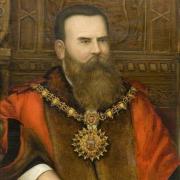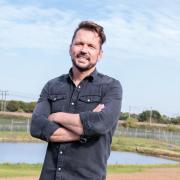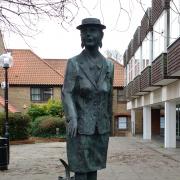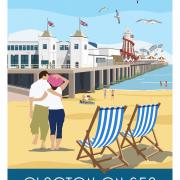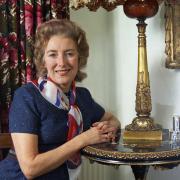With the help of finance expert and writer Philip Beresford, Essex Life reveals the 2018 Essex Life Richest 50
The Essex Life Rich List is sponsored by Clearwater Wealth Management
Clearwater Wealth Management provide a wide range of expertise and knowledge in delivering the financial aims and aspirations of clients as well as peace of mind for the future. Their offering is a seamless service of distinct quality, professionalism and expertise across all aspects of wealth management, supported by the successful St. James’s Place Wealth Management Group.
It’s their philosophy to build exceptionally strong, trusted and long lasting relationships with clients. Their financial services are tailored to provide clients with peace-of-mind regarding their personal financial affairs. Wealth managers will contact you at your convenience to discuss your specific requirements.
Visit clearwaterwealthmanagement.co.uk for more information.
______________________________
Our county’s top 50 most wealthy entrepreneurs, celebrities and business leaders now have a collective worth of £13.586bn in this the 15th Essex Life Richest 50 — a new record.
Yet while it seems that the only way in Essex is to make money, the brutal truth is that the growth of these fortunes is slowing dramatically. In 2017 we saw a record 23.5% gain in the collective total of our then Richest 50, but this year the growth above last year’s total of £13.47bn is under 1% (0.86% to be precise).
While property tycoon and TV celebrity Lord Sugar returns to our number one slot with a £1.3bn fortune, we have lost one billionaire this year, as serviced office king Mark Dixon has seen his wealth drop to £885m from £1.02bn last year. Our bottom line too has dropped from last year’s £66m to £60m, reflecting the uncertainty in the economy in the shadow of Brexit.
On a cheerier note, still the most striking aspect of the 50 names that follow is just how many of these fortunes are self-made by people who often came from very humble backgrounds.
Just two of our names in this year’s list inherited their money, half last year’s total. It is also easily the lowest proportion of inherited wealth in a regional list of this kind in the 30 years that such lists have been compiled.
Many of our entrepreneurs who have made hefty fortunes started out in humble roles. Ray O’Rourke worked as a ‘pony boy’, pulling carts in and out of tunnels during the building of London Underground’s Victoria Line in the late 1960s, while Simon Dolan was expelled from Chelmsford Grammar School at 16 and later went to work on the local market, which served him well in sharpening his business skills for later life.
Graham Peacock started working in petrol stations in his late teens, but did not start his own business until he was in his 40s, proving that it is never too late to become an entrepreneur.
It proves there is more than a whiff of truth in the idea that Essex is a county of go-getters who strive to forge their own futures. And we find this entrepreneurial wizardry across the county, with no one town dominating our list. This year there are five entries from Rainham, four from Brentwood, three from Epping with two each from Colchester, Chelmsford, Southend and Stansted.
We also have more than our fair share of celebrity. Aside from number one Lord Sugar there is of course Leystonstone-born David Beckham and his Harlow-born wife Victoria, who continue to amass wealth on the back of lucrative sponsorship deals. Meanwhile, Epping Forest resident Sir Rod Stewart may be having trouble selling one of his Essex properties, but he still wows his fans on his tours.
Proximity to London and its financial services industry has always been a boon for the Essex economy. But equally importantly is the sheer diversity of the local economy. There are 15 of our 50 in construction and property, another nine in retailing, with seven in both low tech and high tech industry.
This year we have seven women in the list, including petrol queen, Susan Tobbell, worth a cool £200m. This is two higher than last year and a new record, but we still have a long way to go before the glass ceiling is truly shattered.
Similarly, six members of the extraordinarily entrepreneurial Asian community make it into the ranks of the Richest 50, the same as last year. Watch out for the Patel brothers, whose uncanny ability to build pharma companies has earned them a
fast-expanding £800m fortune.
We watch with interest what effect the long drawn-out battle over Brexit will have for fortunes of the county’s wealthiest people next year, but as people with track records of fighting adversity and grasping opportunities, you should think twice before betting against our entrepreneurs and business leaders!
RULES OF ENGAGEMENT
To qualify for the Essex Life Richest 50 is no simple matter. An individual must either work, live or be born in the area or have a substantial presence in the county.
Their wealth is assessed on land holdings, shares in quoted or private companies and any sale proceeds from company sales. Quoted company stakes were valued at the end of August 2018.
Private companies are generally valued at about ten times their latest profit figures, depending on the financial health of the operation. We have no access to detailed personal financial records, such as bank accounts or the like, so make no allowance for these.
1) Lord Alan Sugar
Property
2018: £1,300m
2017: £1,200m (2nd)
Lord Alan Sugar returns to the top of the Essex Life Richest 50 rankings thanks to the fortune he is still making from property, although he is better known for battering would¬be tycoons with withering put¬downs in The Apprentice.
As well as completing his Crosspoint development in London, he last year sold a Florida residential site for £6.8m and another in Spain for £8.5m. He also bought a building on London’s New Bond Street for £48m. The savvy, Chigwell¬based tycoon is expected to make another good return on these developments, if his successful £65m sale of London Haymarket to Qatari investors after he bought it for £31.5m just two years before is anything to go by.
He had earlier made £50m from turning around a Mayfair tower block in five years. The son of a Hackney tailor, Lord Sugar’s route to wealth came with the Amstrad consumer electronics operation he founded in his early 20s. He should have made around £36m personally from the £125m sale of Amstrad in 2007 and after chairing Premiership football club Tottenham Hotspur from 1991 to 2001, he picked up at least £25m for his stake.
An inspirational business leader to many, he was appointed as David Cameron’s enterprise tsar after serving in a similar role for Labour. However, Theresa May took exception to what she called the peer’s, ‘old fashioned views on women in the workplace’ some years ago. Lord Sugar last year obliged The Daily Mail to pay him £20,000 damages for describing him as a ‘spiv’, handing the cheque straight to Great Ormond Street Hospital.
Such slights will be water of a duck’s back for Lord Sugar. His main property company Amshold showed £567.9m of assets in 2016¬17 (up £49m). We value his businesses at £1.2bn and add at least £200m of cash and other personal property assets. He is now worth at least £1,300m.
~~~~~~
2) Jon Hunt
Estate Agency and Property
2018: £1,250m
2017: £1,250m (1st)
Colchester-born Jon Hunt last year won a 10-year battle to build a basement extension under his Kensington home. The French embassy objected to the plans, even claiming that the excavation represented a breach of the 1961 Vienna Convention by disturbing the peace of their diplomatic mission.
The three-story basement will accommodate a tennis court, swimming pool and space for some of Hunt’s impressive car collection. It may also enhance the value of the property, perhaps to as much as £100m. Hunt though does know a thing or two about property as the former owner of the Foxtons estate agency group.
From an Army family he was awarded a sports scholarship to Millfield boarding school. He left after O Levels to join the Army, passing basic training for the Royal Artillery, where his father had been a colonel. After leaving the Army, and following a short spell washing cars in Ottawa in Canada, Hunt returned to the UK in 1972 and spent the next eight years working as an estate agent in Surrey.
Hunt’s property career began at age 19 when he borrowed a £100 deposit to buy a one-bedroom conversion flat in Walton Road, Woking for £4,500. In 1981 Hunt, then aged 28, co-founded Foxtons. The company took its name from a village near Hunt’s Suffolk home.
The firm’s office in London’s Notting Hill Gate neighbourhood distinguished itself from competing estate agents by opening a then unusual 74 hours a week, including weekend and evening hours, rather than the conventional 40 hours worked by rival estate agents. Foxtons expanded to other London districts, each new branch offering a 0% commission in its first three months of operation to attract customer.
Hunt sold up at the height of the boom for £375m in early 2007. After the sale of Foxtons, Hunt made substantial commercial property investments in Central London at the bottom of the market in 2008. As well as commercial property, Hunt has been active in residential development too in Central London.
He turned down an unsolicited offer for his seven-storey townhouse in Kensington Palace Gardens in 2008, reputedly for £200m. Hunt is now dipping his toe into new waters, a luxury serviced–office business called Dryland.
His other assets include a car collection and the Suffolk estate Heveningham Hall, which he is turning into a luxury holiday resort and restoring the grounds to their original Capability Brown-design splendour. In 2010 he launched Bacchus Partners, hoping to snap up derelict properties across the southeast and east of England, then turn them into housing.
With a commercial property portfolio worth at least £600m and the swiftly appreciating classic car collection, Hunt is worth £1.25bn. In 2012 he sold a 1963 Ferrari 250 GT for around £20m.
~~~~~~
3) David Sullivan
Property
2018: £1,100m
2017: £1,100m (3rd)
David Sullivan will be praying that West Ham Utd FC can recover from a poor start to the 2018¬19 season. After eight games, the Hammers are 15th in the Premiership with just seven points. Chigwell¬based Sullivan owns a 51% stake in the club, which now play at the former 2012 London Olympic Stadium.
Sullivan made most of his early money from porn, sex shops and erotic films. At one point during the 1970s he was said to be responsible for half of the UK’s adult magazine titles. In more recent years, the Cardiff¬born magnate has shown himself to be an artful property investor. We now see nearly £508m of net assets in his three major property companies.
Football clubs are notoriously difficult to value, but we still value Sullivan’s stake at around £325m, as the owners turned down an offer of £650m in 2016. Asset sales such as the £50m from Sports Newspapers in 2007, a £100m pension pot and £160m of recent property deals comfortably elevate Sullivan to billionaire status.
He once showed off his £7.5m, 14¬bedroomed home to Eamonn Holmes and Ruth Langsford for their Channel 5 programme How The Other Half Live. Sullivan’s son Dave Junior last year said that his father had built a fortune of £1.1bn – adding that he wanted to build a £5bn fortune to pass on to his children.
~~~~~~
4) Mark Dixon
Property
2018: £885m
2017: £1,020m (4th)
Mark Dixon, the son of a Ford car mechanic, has lost his billionaire label over the last year after the sharp fall in the value of his IWG serviced office operation. Dixon went to Rainsford Comprehensive School, leaving at 16.
He began his entrepreneurial career selling peat from a wheelbarrow. He soon set up a sandwich business, Dial¬A¬Snack, in 1976. When this failed he travelled the world, working his passage around Europe, Asia and Australia with odd jobs ranging from iron mining to bar work. Dixon later returned to his native Essex and invested £600 in a burger van on London’s North Circular Road.
With the proceeds, along with his savings, he bought other vans but struggled to get enough bread rolls for the business – so he set up his own bread company supplying fast¬food vendors. He sold this in 1988 for £800,000. Having relocated to Brussels he noticed how business people held meetings in cafes. So in 1989, he was inspired to set up Regus, providing offices with social and meeting spaces.
The concept worked and he floated the company in 2000. Renamed as IWG, the business is now valued at £2.17bn, after a recent fall in its share price. Dixon sold shares worth nearly £102m in September 2016 and a further £94m worth in June last year (2017). Previous share sales add around £100m.
He retains a £551m stake. He has received at least £90m of dividends since 2008 and has other assets, including the Chateau de Berne vineyard in Provence and a five¬star, 25¬room hotel. In all he should be worth around £885m.
~~~~~~
5) Sir Charles Dunstone
Computers
2018: £876m
2017: £860m (5th)
Sir Charles Dunstone is not having the best of times. The Saffron Walden¬born entrepreneur is under pressure from investors in the TalkTalk broadband operator that he chairs. There is even talk that he could be ousted according to press reports. Dunstone is of course best known for co¬founding the Carphone Warehouse operation with his former Uppingham public schoolboy friend David Ross.
The pair set up the business from a Marylebone flat in 1989 with £6,000 savings. Over the following 29 years few people can have been more instrumental in making mobile phones and tablet computers ubiquitous parts of modern life.
A keen sailor, Dunstone’s stake in Dixons Carphone, created by a merger with Dixons Retail, is now worth £209m. His stake in TalkTalk, which was spun off from Carphone and later floated on the stock market in 2010, is now worth £407m. TalkTalk has struggled since a high profile cyber¬attack three years ago. With a reputation as a fierce party thrower at his Holland Park pad, perhaps it’s no surprise that Dunstone’s entrepreneurial appetites have also turned to food.
He now has more than 70 Five Guys hamburger restaurants and he’s begun rolling out a second fast food chain known as MOD — Made on Demand. This chain allows diners to design their own pizzas, picking extra toppings for no further charge. Dunstone also owns 10% of Boxpark, the fast food market in Croydon. He has also diversified into property, including the online estate agent HouseSimple. In all with past dividends, Dunstone should now be worth £876m after tax.
~~~~~~
6) Vijay & Bhikhu Patel
Pharmaceuticals
2018: £800m
2017: £675m (6th)
The new £42m Vijay Patel Building at Leicester’s De Montfort University is winning architectural prizes. It is also the result of the single biggest donation in the university’s history by Vijay Patel, a graduate of the university’s School of Pharmacy. That he could afford such a donation is due to the entrepreneurial talent of Vijay Patel and his brother Bikhu.
They arrived in Britain in the 1960s with just £5, a handful of O Levels and a hunger to succeed. In the early days Vijay saved up money to go to pharmacy college by working in a chip shop in Wembley and in 1975 he purchased his first pharmacy in Essex. Bhikhu trained as an architect and came into the business in 1984, a few years after Vijay established Basildon¬based Waymade to distribute and market pharmaceutical products and prescription medicines.
In 2002 they spun out Amdipharm, which picked up treatments that were out of patent and held no special value for their multinational drug firm owners. 10 years later they sold the business for £367m, retaining a £90m shareholding. Another Patel company, Atnahs Pharma set up in 2013, saw its profit rise strongly to £24.1m on £107m sales in 2017¬18.
This operation’s assets grew to nearly £34m in a year. The brothers also made a substantial sum from the 2015 sale of AMCO, a niche pharma company, for £2.3bn. We raise the Patels to £800m this year.
~~~~~~
7) Sir Jack Petchey
Property
2018: £550m
2017: £550m (7th)
The Jack Petchey Foundation has awarded grants totalling £118m since it started in 1999. Its funds help programmes and projects for young people aged 11 to 25, mainly in London and the South East. It has even spent £1m on a training ship for the Sea Cadets, the TS Jack Petchey, which has been in service since 2010.
That 93¬year old Sir Jack Petchey can afford this is due in large part to his uncanny business acumen. A champion of hard work and self belief, Petchey was prosecuted at the age of 12 for working under age. But not everyone saw Sir Jack’s promise.
He was turned down for officer training while serving in the Navy’s Fleet Air Arm during World War II. After the war, while working as a clerk at the Solicitor’s Law Stationery Society, he was rejected for management training and told he would never make a businessman.
Petchey first earned money running errands and then began working after the war as a taxi driver. Using his £39 Army gratuity, he built a fleet of taxis. He later expanded into used cars and property. In 2006 and 2007, Essex¬based Petchey sold around £225m of stakes in six companies.
Further sales in 2013 netted Petchey more than £50m. Today his Petchey Holdings has a commercial property portfolio worth over £500m. Knighted in the 2016 New Year Honours for services to young people in East London and Essex, Petchey followed that by marrying the royal sculptress, Frances Segelman in February 2017.
He still works and insists, ‘retirement is not on the cards’. He plans to leave all his fortune to the Foundation.
~~~~~~
8) Mark Burnett & Roma Downey
Media
2018: £390m
2017: £390m (9th)
Mark Burnett, the Essex¬born reality TV supremo of Hollywood, is reckoned to be one of Donald Trump’s best friends. Indeed he devised the hit TV show The Apprentice which propelled Trump to stardom and ultimately perhaps the White House. Yet it has not been all plain sailing for Burnett, who is coming under increasing pressure to reveal whether there are tapes of Trump preparing for the show using racially derogatory language.
Burnett showed up in Hollywood more than 30 years ago with just $200 to his name. Educated at the Warren School in Romford, Burnett fought in the 1982 Falklands conflict. Over the years the former paratrooper dreamt up reality TV hits including Survivor, Shark Tank and The Voice.
He and his Irish actress wife Roma Downey are the driving force behind The Bible and other faith¬based programmes. Downey also now has her own star on Hollywood Boulevard. Hollywood studio MGM spent $343m in September 2015 to take a 55% stake in their TV production company and a few months later the pair exchanged their remaining stake for 1.3m MGM shares.
That stake should now be worth around £94m. In December 2015 Burnett signed a five¬year contract to become president of MGM Television while Downey became chief content officer of the faith and family division. She and her husband last year oversaw the $100m production of Ben¬Hur, a modern retelling of the religious epic. Despite the lower value of their MGM stake, we leave the Malibu¬based couple at £390m this year.
The couple last year bid $1.5m for a work by the Swiss artist Urs Fischer at Sean Penn’s fundraising event for the hurricane¬ravaged island of Haiti.
~~~~~~
9) The Ives Family
Industry
2018: £388m
2017: £368m (10th)
East Ender and former boxer Bill Ives died last August. He won the ABA heavyweight title in 1966, 1967 and 1968. ‘I could have turned professional,’ Ives said shortly before he died, ‘but I was short sighted and there weren’t the treatments available back then to enable me to continue boxing. Plus, I wasn’t actually very good! It was a blessing in disguise as it turned out.’
He founded Rainham Steel in 1973 as a steel supplier. The Essex-based business diversified and began to focus on builders and builders’ merchants in the 1980s. Profits almost doubled to £4.5m on sales of £108.5m sales in 2016-17, with the business’s assets ticking up to almost £45.2m.
However, adding Ives’ salary to the bottom line pushes the profit to more than £10m. We raise the value of the business to £170m this year, but large investments and property assets take the Ives family to £388m.
A substantial donor to the Tory party over the years, Ives also invested in Boxnation – a TV channel dedicated to the sport where he first made his name.
~~~~~~
10) David & Victoria Beckham
Fashion & Football
2018: £340m
2017: £300m (12th)
The Beckhams are beefing up their commercial interests while continuing to earn well from the skills which initially earned them money. While Victoria is set to reprise her role as ‘Posh’ in some form of Spice Girls reunion, her husband is starting a new Major League Soccer franchise in Miami.
But the couple’s biggest break over the past year is a £30m private equity investment in Victoria’s struggling fashion line. The money poured in by David Belhassen, the man who financed the growth of the patisserie chain Paul, valued the fashion label at £100m. The pair, who divide their time between the United States and UK, are both launching their own cosmetic ranges.
David meanwhile has a new grooming brand with L’Oreal called House 99, while his wife is developing a fragrance and skincare range with Estee Lauder. Footwork Productions, David’s main company, paid a dividend of £12.7m in 2016. The separate Beckham Brand Holdings, a third of which is owned by impresario Simon Fuller, showed a dividend of £10.2m in the same year.
Financial statements for Victoria’s eponymous fashion label do not make pretty reading, showing a loss of £8.5m in 2016, debts of £13.1m and flat sales. But the private equity investment, which aims to pay for a digital operation and more stores, justifies a stronger valuation for the business. We raise the golden couple to £340m – a figure which includes £15m, less tax and spending, for the dividends.
~~~~~~
11) Ray O’Rourke & Family
Construction
2018: £313m
2017: £306m (11th)
Ray O’Rourke worked as a ‘pony boy’ pulling carts in and out of tunnels during the building of London Underground’s Victoria Line in the late 1960s. He and his brother Des started their building firm in 1977, using a utility room between Ray’s kitchen and garage as the office. Clients were told the whirling of the family washing machine was a noisy JCB digger.
Starting out with just a £2,300 contract job, the business has grown into an engineering and construction giant with an annual turnover of around £1.5bn. The locally¬based group’s projects span the world, with large operations across the UK, Australia and the Middle East.
Renamed Laing O’Rourke in 2001 when it acquired the construction division of John Laing, the operation has built diverse structures ranging from the London Olympic Stadium and luxury apartments at the city’s One Hyde Park, to mining infrastructure in the Australian outback and the UK’s most recently built nuclear power station. However, the past few years have not been easy for the business, which has sustained hits from a number of difficult projects, including losses of around £80m from a PFI hospital in Canada.
The main business recorded a pre¬tax loss of £267.2m in 2015¬16 but followed in 2016¬17 with a much smaller £80.8m loss. However, we see £282.5m of assets in O’Rourke Investments Holdings (UK) and value the business on that figure.
We assume the O’Rourke family is the ultimate owner of the operation, adding over £30m for other assets and past salaries. Jersey¬based O’Rourke has a home in Brentwood and received an honorary knighthood in 2011 for services to the UK construction industry.
~~~~~~
12) Stephen Conway & Family
Property
2018: £300m
2017: £270m (12th)
Stephen Conway’s Loughton-based developer, Galliard Homes, is working on three developments in Birmingham, together worth £500m. Galliard, which is one of London’s largest developers, was co-founded in 1991 by Conway. An East Ender by birth, Conway left school in 1964 aged 16 and developed his early entrepreneurial spirit through trading, working in a bank and running a market stall at weekends.
“When I was a kid, I worked in the market running my own stall. After I left school with five O Levels, my mum wanted me to get a ‘proper job’ paying £6 a week in a bank. But the attraction of getting £40 a week from the market on a weekend was too great to resist,” Conway recalls.
In 1969, he began his career in industrial finance, working for the First National Finance Corporation before being poached to run a small property-lending bank until 1974. Then followed the worst property and banking crash of the century. Conway saw it first hand and learnt the lessons before going to work for a property company until he co-founded Galliard Group.
It made £74m profit on £391.9m sales in 2016-17. Galliard’s net assets have also soared to almost £202.5m – an increase of nearly £60m in 12 months. Conway and his sons own well over half the company, so we raise the family by £30m this year taking them to £300m.
~~~~~~
13= Alfie Best and Family
Residential Parks
2018: £250m
2017: £160m (23rd=)
Romany gypsy Alfie Best left school at 12 but today he owns more than 60 holiday and caravan parks in the UK, houses in Hampstead as well as a 360-acre estate in Potters Bar. Wyldecrest Parks, his West Thurrock-based parks business, is now growing an estate of holiday parks in the US.
He has also snapped up three golf clubs and has plans to build accommodation around these to develop a golf mini-breaks business. Best’s main company, Best Holdings, showed £42.7m net assets in 2016, down £6.4m. We see another £32.1m in another caravan company. He has not been afraid to spend since making his fortune. He once shelled out £180,000 on a vast kitchen and £12,000 on a copper bathtub.
His car collection includes a £290,000 Bentley and a £185,000 Ferrari. His son, also called Alfie, became a nightclub owner at the age of 16 when he bought Chelsea’s in Hertfordshire – despite having to wait for a legal tipple. Alfie junior is also a star in a new ITV reality show, Absolutely Ascot, having previously starred alongside his father in My Big Fat Gypsy Fortune and Rich Kids Go Shopping.
“I passionately believe if an idiot like me can make a success of business, anyone can,” Best senior has said. His rapidly-growing empire should now be worth £225m. We add a further £25m for other assets.
~~~~~~
13= Michael Gooch
Finance
2018: £250m
2017: £250m (14th)
Mickey Gooch first became interested in the world of foreign exchange trading while chatting to some currency dealers in a local pub. The then accountant from Leigh on Sea soon left for New York, where he worked for a number of blue chip American financial institutions.
It was only when he was made redundant from the broker Refco in 1987 that he set up the Wall Street brokerage GFI, specialising in government bond options. He floated the business on Wall Street in 2005 and remained chief executive until 2013.
It was taken over by BGC Partners two years ago, netting the Gooch family around £185m. Other Gooch family assets add around £65m. Gooch’s son, also Mickey, is a comedian.
~~~~~~
13= Gordon Sanders & Family
Care Homes
2018: £250m
2017: £200m (17th=)
A successful property developer, Gordon Sanders bought Hadleigh¬based Runwood Homes for £60,000 in 1988.
A decade later he sold the company’s assets and moved into care homes, growing a chain of 67 in Essex, the Midlands and Northern Ireland. The business has invested £22m in upgrading its accommodation and now has 4,585 beds.
The business saw its profits more than double in 2017 to £17m on a £130m turnover. It also showed £166.3m net assets. There were press reports late last year that the business was up for sale with a £350m price tag.
We wait to see the outcome of the sale, but raise Sanders to £250m on the back of a strong year and a £7m dividend.
~~~~~~
16) Andrew Hill & Family
Construction
2018: £244m
2017: £193m (20th)
Hill Partnerships is working on developments covering all spectrums of the booming London and south eastern housing market.
In recent times it has built houses costing up to £4m in Esher and yet is also working on regeneration of tired housing estates. Formed in 1999, Hill Partnerships is run by Andrew Hill, who with his family and trusts owns most of the company.
Hill Holdings, its Waltham Abbey¬based parent company, made record profits of £47.2m on £415.6m sales in 2017.
With a strong balance sheet and £128.5m assets, it is worth at least £300m. The Hill Family stake is worth nearly £236m. Dividends and other assets add £8m.
~~~~~~
17) Gary Widdowson & Family
Metals Recycling and Property
2018: £235m
2017: £235m (15th)
Show jumping enthusiast Gary Widdowson last year paid more than £62,000 for two embryos fertilised by their Dutch Warmblood stallion Big Star. An international show jumper in his youth, Widdowson and his wife Beverley became the first owners to have two horses in the same Olympic team.
The couple own Nick Skelton’s horse Big Star and Michael Whitaker’s Cassionato, which was also selected for Rio. Harlow-based Widdowson made his fortune from recycling, selling his London-based metal operation for £120m in 2006. Two years later he bought Kelling Hall and the accompanying 1,600-acre Norfolk estate for £25m back.
He and his wife have turned the holding and many of its houses into a luxury holiday destination.
We can see £110m of assets in seven separate companies. Widdowson and his family should be worth £235m with other assets.
~~~~~~
18) Victor Chandler
Gambling
2018: £230m
New entry
The legendary Victor Chandler is back. Last summer, three years after cashing in his remaining 45% stake in his eponymous gambling operation, he has returned to the fray with Bet Lion — a start¬up offering online gambling services in East Africa.
“The market is already showing huge growth and smart phone penetration is much higher than many realise. With that has come an excellence in micro¬payments,” commented Chandler. The Ugandan Bet Lion operation has already launched, with Tanzanian and Kenyan start¬ups said to be imminent.
Born in Essex, Chandler was later expelled from Highgate School for repeatedly absconding to go clubbing. He later went to catering school in Switzerland. After some wild years in Spain, he returned to take over the family’s bookmaking business in 1974 when his father died.
He knew little of the industry and nearly sold the business early on, but he developed a successful operation by creating a chain of bookies which he sold to larger chains while retaining the freehold on the properties.
In 2000 he moved to Gibraltar to escape the UK betting tax. In May 2014 Chandler sold his 45% stake in BetVictor to former bookie Michael Tabor, who already had a 45% stake. No figures were disclosed but there had been previous talk of a £400m sale or float. Cautiously we run with a £350m price. Art, property and investments put Chandler at around £230m.
~~~~~~
19) Vipul Thakrar & Family
Food Production
2018: £209m
2017: £201m (16th)
The upmarket Dishoom restaurant chain is the latest business venture from the Thakrar family, now led by Vipul Thakrar. Originally from India, but later expelled by Idi Amin from Uganda, the Thakrars became known as the rice kings of Britain, with half the market.
The family, with a mill in Rainham, perfected Basmati rice and soon every supermarket stocked the wares produced by their company, Tilda Rice. Tilda was sold in 2014 for a reported £220m. Since then younger members of the family, Shamil and Kavi Thakrar, have launched Dishoom, which now has seven restaurants.
Its bacon naan rolls and chai tea lattes have achieved cult status, helping Dishoom to double its profits to £1.75m on £27.8m sales in 2016. Net assets rose by £8m to £22.7m too and we raise the family accordingly this year to £209m after tax and re¬investment.
~~~~~~
20= Graham Peacock
Fuel Retailing
2018: £200m
2017: £200m (17th=)
Graham Peacock has moved into buses having made his fortune in petrol stations. He sits on the board of Rotala, a stock market listed company that provides bus services for local authorities, businesses and other organisations.
He also has a £1.5m stake there. But this is small beer beside his petrol retailing fortune. Peacock started working in petrol stations in his late teens, but it was not until his late 40s that he started his own business.
He and his business partner Susan Tobbell set up their petrol station operation in 1997 with just £1,000 of savings. By the time they sold MRH (GB) in early 2016, the Epping-based business had 450 outlets generating annual sales of more than £2bn. Most of these outlets were branded as BP, Esso or Torq filling stations. Peacock served as chief executive and owned a 22% stake in the business.
In 2016 a US private equity operation bought the business for around £1bn and Peacock retired. Taking account of previous earnings, the sale price of his stake and tax, he should easily still be worth £200m.
~~~~~~
20= Susan Tobbell
Fuel Retailing
2018: £200m
2017: £200m (17th=)
As one of the Liberal Democrats’ biggest donors and a member of the party’s business advisory group, Susan Tobell will be hoping that the party can make a breakthrough under the leadership of Sir Vince Cable. So far not much has happened. But Tobbell has deep pockets.
Starting with her business partner Graham Peacock and just £1,000 back in 1997, the pair built up their Epping-based petrol retailer MRH into a business with £2bn annual sales and more than 450 sites.
Tobbell served as finance director and owned a 22% stake in the business. A US private equity operation bought the business for around £1bn in 2016. Taking account of previous earnings, the sale price of her stake and a £1.5m stake in a quoted bus operator, Tobbell should easily be worth £200m after tax.
Her LinkedIn profile page declares ‘every day’s a Saturday’ as she is now retired.
~~~~~~
22= Nigel Morris
Finance
2018: £180m
2017: £180m (21st)
Nigel Morris knows all about lending to the posh and not so posh. The Billericay¬born co¬founder of the American Capital One credit card business is betting now is a good time to lend to the riskiest borrowers through an investment in a company called LendUp Global, where he has also joined the board.
Morris also chairs posh pawnbroker Borro, which lends money to wealthy people, taking fine wine, jewellery, antiques, expensive musical instruments and even a Rolls Royce as security. Originally hired to implement an information¬based strategy in 1988, he became the architect of the hugely successful Capital One card.
Morris retired from Capital One in 2004 having sold £136m worth of shares. Now based in Virginia, Morris is also managing partner of the investment group QED Partners, which recently poured money into the UK student lending company Future Finance.
He has also backed Prosper.com, an online loans company. Morris sits on the boards of the London Business School and National Geographic. Other assets keep him at £180m.
~~~~~~
22= Sir Rod Stewart
Music
2018: £180m
2017: £170m (22nd)
Gilt¬bronze side tables and a teak lounge chair were some of the items up for grabs at a planned house clear out from Sir Rod Stewart’s old Epping home, Wood House, which was intermittently occupied by Winston Churchill in 1940 and 1941. Earlier this year Stewart slashed the price of Wood House from £7.5m to £5.95m to help sell the property, which has been on the market since 2016.
The veteran rocker’s new home is the Grade II listed Durrington House, near Harlow. He bought the £4.65m property in 2013 and spent three years renovating the 10¬bedroom property, which is set in 46 acres of pastures and ancient woodland. Such extensive grounds should give Stewart and his wife Penny Lancaster plenty of space to indulge their passion for growing flowers.
The couple are regulars at the Chelsea Flower Show and the rocker revealed that when suffering from throat cancer he considered quitting music to set up a flower business. He is also planning a £5m 50ft pool at the house for his son, who wants to be an Olympic swimming champion.
Stewart last year renewed his marriage vows to Penny, selling pictures of the event to Hello! magazine and donating the fee to victims of the Grenfell Tower blaze. Despite failing to even make the charts with his revamped version of his 1978 classic Do Ya Think I’m Sexy with Joe Jonas’s DNCE, Stewart toured extensively last year.
His 44 shows took £18.8m at the box office and teamed up with Cyndi Lauper for 17 gigs across North America during the summer. The lucrative touring schedule prompts us to raise Stewart to £180m this year.
~~~~~~
24) Sir Jonathan Ive
Design Technology
2018: £177m
2017: £157m (26th)
Regarded as the world’s greatest designer, Chingford-born Sir Jonathan Ive, or Jony Ive as he likes to be called, resumed his leadership of Apple’s design team late last year – two years after he stepped back from day-to-day managerial responsibilities to focus on its new futuristic California headquarters.
Ive is the designer behind a range of best-sellers, such as the iPods, iPhones and iPads. The ex-Newcastle Poly industrial design graduate was lured to California in 1992 and five years later was promoted to become the company’s design chief at 29.
Details of Ive’s pay and shareholding are not made public, but Apple’s chief executive Tim Cook last year took home at least $102m (£75.5m). The strong rise in Apple’s share price and the size of Cook’s pay packet, make us confident in raising Ive to £177m now. He owns a £10m home in San Francisco.
Ive once said that if he didn’t work for Apple he would like to design Christmas decorations. Shortly afterwards the London hotel Claridge’s hired the design guru to create a ‘festive installation’ in 2016.
~~~~~~
25) Sir Keith Mills
Loyalty cards
2018: £160m
2017: £160m (23rd=)
Born in Brentwood, Mills made his money from loyalty cards – first Air Miles, taken over by BA in 1994 and later the Nectar card, which he sold in 2007 netting £160m. But sport is his passion.
He was a leading backer of Sir Ben Ainslie’s unsuccessful America’s Cup sailing campaign last year. This was the loyalty scheme entrepreneur’s latest venture in the sporting arena, having previously organised the Invictus Games. He was also deputy chairman of the organising committee for the London Olympics.
His other assets include around £2m of company assets and a recent £2.5m investment in video messaging app Wordeo.
He settled a claim against Coutts Bank where he had £73m of his wealth tied up in AIG Bonds, and had been seeking £8m in damages. So we still value Mills at £160m for now.
~~~~~~
26) Simon Dolan
Business Services
2018: £141m
2017: £140m (28th=)
“I earn £3m a year, but I don’t just throw money away,” Simon Dolan told the Guardian newspaper in August. Yet, as he recounted: “When I was 21, I had nothing. Debt was spiralling, I was three months behind on my mortgage and I was totally desperate. I ended up placing a £10 advert in a local paper offering to do people’s accounts. It’s the only thing I knew – I’d previously worked at an accountants for 18 months.
“A florist responded and I handled her accounts for £99. That gave me enough money to place another ad. From there I gained another client, then another. By 2014, when the business had 14,000 clients, I sold it to a private equity firm for £81m.”
Dolan started his entrepreneurial career selling scratch cards in the playground of King Edward Grammar School in his native Chelmsford. After being expelled at 16 he began selling cheese and eggs on a Chelmsford market stall. He says it taught him, “the gift-of-the-gab, commitment to hard graft and strong arithmetic”. After a range of jobs including selling photocopiers and timeshare apartments, he started his accounting work.
Since then Dolan has become enthused by motor racing and created his own team, Jota Sports, in 2011. Jota won its class in the 24 hour Le Mans race three years later, coming fifth overall. His Jota Group now has three divisions, focusing on motorsport, engineering for racing cars and an airline based at London Southend. Dolan also owns the Mandalay Estate in the Caribbean island of Mustique once owned by David Bowie, which cost him £14m.
An avid fan of the late music legend, Dolan even named one of his sons Bowie. He also has an apartment in Monaco, two properties in the UK and a château in south-west France. In all Dolan is now easily worth £141m.
~~~~~~
27= Brendan O’Malley & Family
Construction
2018: £140m
2017: £160m (23rd=)
Woodford Green-based Mulalley Group faced a challenging 2017-18 with property market uncertainty (particularly in London), planning delays and the uncertainty over future building regulations resulting from the Grenfell tragedy.
Profits, however, picked up slightly at its parent company Sherrygreen, to £8.4m on a £140.2m turnover. Established in 1972 by the O’Malley family, Mulalley works largely with public sector clients across London and south east England.
There is a future work pipeline worth £925m. On the back of nearly £104m net assets, we now value the business and the low-key O’Malley family at £140m.
~~~~~~
27= David Wernick & Family
Construction
2018: £140m
2017: £140m (28th=)
David Wernick started work in the family business at the tender age of 11 when he had a summer job to sort and count bolts that had become all mixed up.
The business in question is the Wickford-based Werrnick Group, which began in 1934 when David’s grandfather – having knocked up a few sheds, crates and chicken houses for his business’s use – erected a sign outside his poultry farm.
‘Sheds for Sale - enquire within,’ it read. Today the group is one of the largest builders and hirers of wooden and modular buildings. It should be worth £130m on the back of a record £15.2m profit in 2016 when it showed £81.6m net assets.
The wider family, led by David Wernick as chairman, is worth £140m with other assets.
~~~~~~
29) Surinder Kandola
Restaurants
2018: £126m
2017: £112m (31st)
The Canadian coffee and doughnut chain Tim Hortons has come to Britain and it already has 17 branches here. Surinder Kandola is the driving force behind the UK expansion. An experienced restaurateur, Kandola already owns Za Za Bazaar in Bristol which reckons to be the biggest restaurant in the UK, seating 1,000 people.
Inspired by the night markets of Asia, the place offers a heady mix of foods from China, India, Italy, Vietnam and other countries. Kandola’s main company, Chelmsford-based GDSK, made a £4.7m loss on £98.7m sales in 2016-17. But it should be worth its £118.2m net assets. Kandola has a 90% stake worth over £106m.
In addition, he owns 81% of the Tim Horton UK franchise operation. While it made a £7.6m loss in its first accounts for the 17 months to the end of 2017, it did show £24.3m of assets, valuing Kandola’s stake at nearly £20m. In all he should be worth £126m.
~~~~~~
30= Pete Flint
Internet
2018: £115m
New entry
“I’m an Essex boy,” says Pete Flint. But he is a long way from Chigwell today. Based in San Francisco, Flint is one of the growing number of Brits enjoying the big time in California’s high-tech boom. The son of a chemistry professor and ancient history teacher, Flint went to Oxford to read physics, inevitably making it to the City for a summer job with JP Morgan. He was tasked with finding out about the internet.
He says he soon realised two ‘life-changing lessons’. The first was: “this internet thing was just astounding”. The second: “I didn’t want to be an investment banker”. After five years at Lastminute.com, he moved to California in 2003 where he read an MBA at the prestigious Stanford Business School. Trying to find a house in his second year, he saw that the internet had not touched the property market.
He immersed himself in the subject during that year and later launched property listing site Trulia with $2m of backing from angel investors. It floated on the stock market in 2012 valued at $449m, with Flint ringing the opening bell on the New York Stock Exchange. Three years later its larger rival Zillow took over Trulia in a $3.5bn deal. This valued Flint’s stake at around $150m.
Still based in San Francisco, he now runs NFX, a venture capital operation, which plans to disrupt the opaque and secretive world of that industry. Taking account of Flint’s other investments, he should easily be worth £115m.
~~~~~~
30= Barry Hearn & Family
Sports Management & Media
2018: £115m
2017: £82m (40th)
“I am into world domination – of a sporting sense,” Barry Hearn told The Daily Mail last year. The Brentwood¬based sports promoter was raised on a council estate in Dagenham. His mother was a cleaner and dad a London bus driver. He trained as an accountant and became the youngest ever chartered accountant to become a member of the institute. Hearn later worked for a large firm where one of his biggest clients was Deryck Healy International, a textile design company.
In 1973, he persuaded the firm that it needed a full¬time finance director. Overnight he had doubled his salary. One of his briefs at Healy was to look at possible acquisitions, so he took the company into snooker, buying the Lucania chain of snooker halls for £500,000 in 1974.
It was such a good investment that he put his own money into it. When Healy sold it in 1982 for more than £3.5m, Hearn owned a third of it. He left Healy in 1982 and formed his own company – Matchroom. He had a Romford snooker hall, a fruit machine and pool table business in the East End, some offices and the best snooker player the world had yet produced, Steve Davis, who simply walked in off the street.
Since then Hearn has dominated snooker, overseeing its extraordinary leap as it became established as Britain’s favourite television sport. He managed the best players, organised many of the top tournaments and sold them to television. He took 20% of his players’ income but re¬invested heavily in the sport.
He is chairman of World Snooker and took a controlling interest in the sport’s commercial business. “It was like meeting an old girlfriend, and she’s gone a bit rough,” he said of the deal. “We took snooker to a health farm, we injected a bit of botox and now she is a beautiful woman again.” He also branched out into boxing, pool, bowling, golf, fishing, poker and darts, giving the latter a much¬needed injection of razzmatazz.
With his son Eddie, who is Matchroom’s managing director, Hearn promotes a roster of big name fighters including Anthony Joshau. Hearn predicts that the world heavyweight champion could become a billionaire if he remains unbeaten over the next 10 years. Matchroom, owned by Hearn and his family, made profits of £13.7m in 2016¬17 on £100.2m sales. It is worth £100m and paid a dividend of nearly £5m to Hearn and his family. With his other assets, Hearn is easily worth £115m.
~~~~~~
32) Lord & Martin Harris
Retailing
2018: £110m
2017: £110m (32nd=)
Lord Harris took over the family carpet business at the age of 15 after his father’s death. He sold this business, which had become Harris Queensway, in 1988 netting £69m. But he is better known for Carpetright, which he founded soon after.
When he stood down as chairman of the Rainham-based business in 2014 after 57 years in the trade, Carpetright had more than 600 shops and annual sales of nearly half a billion pounds. He netted share sales of at least £50m from Carpetright over the years. The Harris family is not listed as a major shareholder any more.
Indeed Carpetright is struggling, with plans to close 92 stores and a £70.5m loss recorded for 2017-18. Its stock market value has fallen to £78m. Harris and his son Martin have now taken on Carpetright with a new venture called Tapi (French for carpets). It achieved over £30m sales in 2016.
We still value Harris and his family at around £110m, although he would have been much richer but for his charitable work, which includes the Harris Federation of 44 school academies.
~~~~~~
33) Harry & Suki Dulai & Family
Food & Property
2018: £105m
2017: £100m (34th=)
Flying Trade Group operates a series of food, hotel and property businesses. The seeds of this diverse Essex¬based empire were sown by Kewal Dulai, who came to Britain from India in 1971.
Dulai founded Surya Foods, which provides global foods to Tesco, Asda, J Sainsbury and Morrisons. Harry Dulai and Suki Dulai, Kewal’s sons, are managing director and chief executive of its parent Flying Trade.
Sales exceeded £131.6m in 2017, with profits of £10.7m. The business’s assets rose to £48.3m. We value the business and the family at £105m.
~~~~~~
34= Avnish Goyal & Family
Care Homes
2018: £105m
2017: £85m (37th=)
Television presenter Fiona Phillips was the guest of honour at the recent opening of Hallmark’s new £13m care home in Royal Tunbridge Wells. Billericay-based Hallmark Healthcare is run by ex-accountant Avnish Goyal.
He decided not to enter the profession, but went into property instead, working with his parent’s property portfolio. But his parents-in-law, both doctors, had built a care home and he saw that this could be a profitable business. In 1997 he launched Hallmark’s first 44-bed home, costing £850,000.
Today it operates 19 care homes and has been rebalancing its portfolio to concentrate on South Wales and the south and eastern part of England. In 2016-17 Hallmark’s profits rose £9.8m on £56.3m sales. The £100m operation is owned by the Goyal family. Other assets take the Goyals to £105m.
~~~~~~
34= Ray Stephens & Family
Industry
2018: £105m
2017: £85m (37th=)
Stansted¬based Inflite made a record £9.7m profit on nearly £66m sales in 2016¬17. The company specialises in precision engineering components for the aviation industry. It started in 1919 when Bill Stephens founded Victoria Welding in Stratford, London.
During the war it made fighter fuselage sections and then later worked with Marconi on the TV aerial at Crystal Palace. Today Bill’s grandson Ray Stephens chairs the parent group. His family own at least 97% of the shares.
With £80.3m net assets, Inflite is easily worth £100m. With other smaller businesses, the Stephens family is worth £105m after tax and spending.
~~~~~~
36) Daniel Watts, Jayne Gee & Family
Property
2018: £100m
2017: £100m (34th=)
Plans to build a new £70million retail park on the edge of Colchester have faced a long¬running legal challenge from the local council and retail giants in the town centre.
Tollgate Partnership plans an out¬of¬town shopping village, which would be 20¬acres on the former Sainsbury’s site, with retail and leisure uses – including a new cinema. Since the 1980s Tollgate Partnership, run and owned by the Watts family, has delivered a shopping centre, business park, Sainsbury’s superstore, new roads and improved access for pedestrians and cyclists in the area.
Today the business is run by the second generation of the family, Jayne Gee and Daniel Watts. Its main subsidiary, Corporate Associates, showed £96.3m net assets in 2016¬17. Other smaller property companies etc. keep the Watts family at £100m until the Tollgate issue is resolved.
~~~~~~
37) Graham & Richard Cherry
Construction
2018: £98m
2017: £95m (36th)
The Cherry family’s Stonebond property operation saw its assets rise sharply to £6.5m last year. But the company is small beer beside the family’s main interest, Brentwood-based Countryside Properties.
Chartered surveyor and estate agent Alan Cherry founded the company in 1958. It was listed on the stock market in 1972. Cherry remained as chairman until his death in 2010.
His sons Graham and Richard, joined the board in 1984 and 1986 respectively. Countryside was taken private in 2005 and later was largely taken over by a private equity group in 2013, although the Cherry family are still involved in the business. Countryside floated on the stock market in 2016 and is now valued at £1.5bn.
The brothers sold shares worth £36m last year and retain a stake worth £35m. Proceeds from share sales, shares in trust and other assets such as Stonebond easily take the family to £98m.
~~~~~~
38) Kevin Taylor
Construction
2018: £90m
2017: £110m (32nd=)
Brentwood-based McLaren Construction has built offices and plants for Rolls Royce, Aviva, Sky News and a host of other big names here in the UK and in the Middle East. Kevin Taylor, a quantity surveyor by training, started the business from his home around the year 2000.
The box for the company fax machines served as his first desk, with his dining room table acting as the boardroom table. Taylor remains chairman to this day. Turnover soared by nearly 25% to a record £600.3m while profits came in at £3.2m in 2016-17. A £27.3m dividend was paid the previous year.
A separate company controlled by Taylor overseeing a number of student accommodation developments shows assets of £31.6m (down £24m in a year). We clip Taylor back to £90m as a result.
~~~~~~
39) Dennis Myers & Family
Finance
2018: £84m
2017: £83m (39th)
Dennis Myers does not seem to want to retire. He now runs a small credit and finance company called Assured Advances and has a small property operation with £4.3m assets.
The Romford-based company may be small, but Myers is the man to make Assured Advances grow. In 2004, he sold his much larger company, Swift Advances, a mortgage and consumer credit lender, to Alchemy Partners, the venture capital operation, for almost £100m.
Myers, Swift’s MD at the time, had started the business in 1984 using the experience he had built up from a finance brokerage operation. With his family trusts, he owned all the shares. We raise the Myers family to £84m allowing for tax and the increase in assets at his property business.
~~~~~~
40) Robbie and Cheryl Cowling
Internet and Football
2018: £80m
New entry
Robbie Cowling left school with no qualifications but trained as a motor mechanic at a Vauxhall garage and was later a self-employed mechanic for a couple of years. In 1984 he became an IT programmer and worked for nine years in various jobs before launching the world’s first ‘Jobs by email service’ for jobseekers in May 1994.
From that has grown JobServe, now a leading recruitment consultancy on the internet. Cowling also bought Colchester United Football Club in 2006, putting £4.5m into the club which was then in the Championship.
The Us are now playing in League Two but are looking good in the early part of the 2018-19 campaign, standing eighth after 12 games. Jobserve had a difficult time when the recession struck in 2008, with several years of losses. But its parent Aspire Media has bounced back, making a record £7.2m profit on £17.7m turnover in 2017.
Aside from Jobserve, it also runs several job-related websites all over the world. JobShark.com operates in Canada, ComputerWork and ComputerJobs are North American operations and Jobnet operates in Australia. Cowling and his wife Cheryl own almost all of it and should be worth around £80m.
~~~~~~
41) Iain Liddell
Logistics
2018: £79m
2017: £75m (44th=)
Ian Liddell worked for a leading shipping line and after gaining experience of the container trade, he hatched the idea for setting up his own freight service operation the day before his 21st birthday in 1984.
Today Uniserve is the largest freight service provider in the UK with over 500 staff. The Tilbury-based operation is entirely owned by Liddell. In 2016-17 it made £4.8m profit on £206.4m sales.
With nearly £75m net assets (up £4m) it is worth that sum. We add £4m for past salaries/dividends and other assets to Liddell.
~~~~~~
42) Rabinder Rai & Family
Care Homes
2018: £72m
2017: £75m (44th=)
RCH Care Homes specialise in dementia-friendly care. The Ilford-based operation was founded in 1988 by Rabinder Rai and it operates 10 care homes across Bedfordshire, Cambridgeshire, Essex and Kent.
In 2016-17 its parent company, Ranc Holdings, went into a £698,000 loss on £23.7m turnover. But the business still has £66m net assets and we value it on that figure.
Rai and his family took a £10.6m dividend in 2015-16. With other assets and past dividends the Rai family should be worth £72m after tax.
~~~~~~
43= Richard Higgins & Family
Construction
2018: £70m
2017: £66m (48=)
The Loughton¬based Higgins Group was founded in 1960 by the late Derek Higgins who died in 2004. The business is performing well with profits rising to £6.5m on a record £290.6m turnover in 2016¬17.
There are £54m of net assets. It has been particularly successful in the London market, delivering a key regeneration project on a Lambeth estate. Higgins’ three sons are directors, led by the eldest, Richard, who is chairman and here representing the family as a whole.
We value the business at £60m, adding £10m for dividends and other assets to the Higgins family.
~~~~~~
43= Frank Van Wezel
Industry
2018: £70m
2017: £80m (41st=)
Frank Van Wezel founded his Hi¬Tec sports footwear business in the appropriately named Shoeburyness. That was back in 1974 and the firm soon became well known for its squash and tennis shoes, later branching out into trainers as Britain’s running boom took off in the 1980s.
Hi¬Tec shoes have sold well in the US and today their wares are bought in 85 countries around the world. The UK company was sold in late 2016 to the US brand Cherokee for $96m.
Van Wezel is a director of League One football club Southend United, which is now looking to build a new £80m stadium capable of taking 22,000¬strong crowds. In all the Dutchman should easily be worth £70m after tax and with other assets.
~~~~~~
43= Gene Willson
Transport
2018: £70m
2017: £70m (48th)
Stansted¬based Titan Airways saw its profits fly nicely to £6m on record sales of £89.4m sales in 2016¬17. The company is run and largely owned by Gene Willson, a qualified pilot.
Titan charters planes to a range of clients. It also owns Satellite Travel Group. About half the company’s revenue comes from transporting mail and freight, but Titan also operates a variety of charters.
Recent passengers have included Premiership and national football teams, rock groups and even royalty. With £38.5m net assets, Titan is worth £65m. Willson owns all but one special share. Dividends take him to £70m.
~~~~~~
46) Mark Anderson
Construction
2018: £64m
2017: £72m (47th)
The Chelmsford¬based Anderson Group reckons to take abandoned and neglected land to create a bright future, ‘wherever the site, whatever the challenge’. It was founded in 1987 by Mark Anderson who chairs and owns the thriving construction operation. In 2016¬17 its profits dipped to £4.3m on £62.1m sales.
With a strong balance sheet and nearly £28m net assets, it is worth £60m. Other smaller company assets take Anderson to £64m. For the company’s 25th anniversary in 2012, a specially¬commissioned work of art was unveiled by the Mayor of Chelmsford.
The 80metre long mural has been created on hoardings around the former White Hart pub site which is owned by Anderson and is next to the group’s head office on Colchester Road, Springfield.
The work, created by Vic Lee in association with Hug London, depicted the history of the company and features several members of the team, including some of its longest¬serving employees. A nice touch indeed.
~~~~~~
47= Christopher Johnson & Family
Industry
2018: £60m
2017: £80m (41=)
Christopher Johnson’s Castledon business slipped into a £3m loss in 2016, although sales hit a record £87.5m. The loss was attributed to the effect of a strengthening dollar on the Southend Airport¬based company’s profits.
It remains in a strong position with nearly £43m net assets. The business was started by Christopher’s father Allan, who worked at the airport and noticed pilots were taking time off due to back and leg problems caused by uncomfortable sitting positions on long flights.
He was inspired to design a seat with adjustable lumbar and leg support, and established IPE (Industrial Precision Equipment) to manufacture the seats for pilots, co¬pilots, navigators and engineers in 1961.
The company’s big break was in persuading Lufthansa, the German airline, to specify Ipeco seats in the mid¬1970s, after which orders from Boeing began to roll in. We clip the value of Castledon (IPE’s parent) back to £50m. We add £10m to the Johnson family for other assets, past dividends and salaries.
~~~~~~
47= Jamie & Jools Oliver
Media & Restaurants
2018: £60m
2017: £150m (27th)
TV chef Jamie Oliver recently revealed that his restaurant chain was hours from bankruptcy before he rescued it by injecting nearly £13m of his own money into the business.
The celebrity chef and entrepreneur said he still did not fully understand why Jamie’s Italian ran into financial trouble and came close to collapse in September last year. He has since shut 12 of the chain’s 37 restaurants and made about 600 staff redundant in an attempt to save the rest of the operation.
Oliver has admitted that 40% of his ventures ended as business failures. In 2015, he shut the last branch of Recipease – his chain of cookery shops – and the last of his four British¬themed Union Jacks restaurants went the same way two years later. Last October his food magazine, Jamie, ceased publication after almost 10 years. But it is not all bad news for Oliver who started to cook at the age of eight in his parents’ pub. The young Oliver enrolled at Westminster Catering College after school and during the summer worked at The Starr restaurant in Great Dunmow.
Fresh from college he earned his stripes at Antonio Carluccio’s trendy Neal Street restaurant in Covent Garden and quickly moved on to become assistant chef at London’s River Café, where he was spotted by a TV producer filming a documentary there. A string of cook books and TV programmes followed.
By 2012 he had shifted 10m books worth £126m. His separate Jamie Oliver Holdings, which controls his media operation, turned in a very decent £5.4m profit on nearly £30m sales in 2016.
All its subsidiaries are profitable. In all, despite the money he has had to inject into Jamie’s Italian, which we value at nothing, and the £13m injected there from his own resources, we reckon Oliver and his wife Jools, mother to their five children, are worth at least £60m. Jools has her own Jools Enterprises operation with £521,000 assets in 2016.
~~~~~~
47= Panna Mashru & Family
Cash & Carry
2018: £60m
New entry
Millennium Cash & Carry started trading from an original branch in Barking. Today the Thurrock¬based group has a cash and carry division and a wholesale branch operating from its 120,000 sq ft warehouse.
A family business, it supplies branded groceries and drinks to UK wholesalers and retailers, and exports to Europe, Africa and the UAE. It is owned by former director Panna Mashru and family. In 2016¬17 Millennium made £5.8m profit on nearly £121m turnover.
With a solid balance sheet and £20.5 net assets, it is a £52m operation. Mashru also owns a property operation with £8m net assets in 2016¬17.
~~~~~~
47= Philip Setter
Promotional Gifts
2018: £60m
New entry
Philip Setter runs Basildon¬based Whitehouse Leisure, which distributes soft toys used as prizes in amusement and leisure venues worldwide and sells soft toys, backpacks and accessories in licensing tie¬ups with films and television shows, such as Minions and Star Wars.
Its licence to distribute Disney soft toys in the UK and Ireland was recently extended to include the Middle East and Africa.
In 2017 the company made £7.5m profit on £48.2m sales. With nearly £29m net assets it is a £60m operation.
________________




